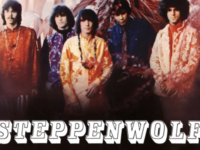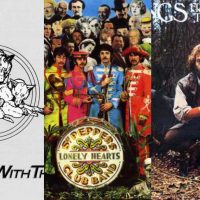Before heavy metal, thrash, speed metal, black metal and nu-metal, their hard-rock precursor blasted from arenas worldwide. Simple straightforward songs about sex, drugs and rock ‘n’ roll (and the occasional ballad) from the likes of AC/DC, Thin Lizzy, Deep Purple, Kiss, Led Zeppelin, Black Sabbath, Rainbow and others ruled the charts. But unlike most of those bands, Britain’s UFO aren’t mentioned much today. Right now, UFO are so far under the mainstream radar that you need advanced detection equipment from NASA to find them.
Music fans 45 or over who listened to AOR rock radio in the ‘70s and early ‘80s, hard rock/metal musicians, and all-around music nerds seem to be the only folks who know much about this band. The musicians who’ve been influenced by UFO include Slash, Tom Morello (Rage Against the Machine), Mike McCready (Pearl Jam), Def Leppard, Kirk Hammett (Metallica) and Steve Harris (Iron Maiden) and Billy Corgan (Smashing Pumpkins). Eddie Trunk of VH-1’s That Metal Show is one of UFO’s biggest fans.
Although UFO is generally remembered as a ‘70s band, since they began recording and touring in 1969, but they’ve continued in one form or another to the present day. Their 22nd studio album A Conspiracy of Stars, in fact, was released in Europe on February 23, 2015; a U.S. street date follows on March 3.
Forty-one members (and counting) have come and gone over the years, including Jason Bonham, Aynsley Dunbar and Billy Sheehan. The classic line-up — the only one that matters to most fans — lasted from 1973-78, and consisted of singer Phil Mogg, bassist Pete Way, drummer Andy Parker and guitarist Michael Schenker. (Guitarist/keyboardist Paul Raymond joined in 1977.)
Many kids were introduced to them one Friday night on Don Kirshner’s Rock Concert in 1975.
UFO, named after London’s psychedelic hangout the UFO Club, was formed by Phil Mogg and Pete Way in 1969. After two bluesy psychedelic albums that went nowhere, they replaced original guitarist Mick Bolton with 17-year-old German guitar wunderkind Michael Schenker in 1973. (Schenker had played with his brother Rudolf’s band the Scorpions for a few years by then). His iconic playing style, which forged catchy, straightforward solos with melody and impeccable tone, gave the struggling blues-rock band the edge it needed to compete in the then-crowded hard rock genre.
The revitalized UFO released a string of celebrated albums — Phenomenon, Force It, No Heavy Petting, Lights Out, Obsession and the stellar live album Strangers in the Night. The band’s most popular songs (including “Lights Out,” “Too Hot to Handle,” “Doctor, Doctor” and “Rock Bottom”) are occasionally played on classic rock stations today.
Perhaps it’s because UFO, though acknowledged now as a pivotal influence on many of the “New Wave of British Heavy Metal” bands in the early ‘80s, were a little too balanced. They weren’t as heavy as Led Zeppelin or as radio-friendly as Bad Company. They didn’t have a gimmick like Kiss; their lyrics weren’t as simple and in-your face as AC/DC’s. They were somewhere in the middle. Mogg had a gritty, melodic voice, and he always sang the lyrics. He never had to resort to screaming or vocal histrionics, and he didn’t have an over-the-top persona like David Lee Roth, Freddie Mercury, Steven Tyler, Robert Plant, etc.
The band hit it big with 1977’s Lights Out, which got to No. 23 on the U.S. Billboard charts. The album, produced by Ron Nevison (who had worked with the Stones, Led Zeppelin and the Who) helped steer the band toward a heavier, more commercial brand of hard rock — and the album blazes away with the panzer attack of “Lights Out” and the macho bragging (de rigueur for the time) of “Too Hot to Handle.” Then things cool down slightly for the remake of Love’s “Alone Again Or,” the lush, moody “Love to Love” (otherwise known as “Misty Green and Blue”).
The next album, Obsession was recorded in an empty post office sorting facility in West Hollywood, and was also produced by Nevison. It boasted straight-ahead rockers like “Pack It Up and Go” and “Only You Can Rock Me,” — and some of the band members sported spandex jumpsuits (that late ‘70s rock wardrobe staple) for live shows, as demonstrated in this clip.
Despite all their newfound mainstream success, UFO couldn’t keep it together. Michael Schenker got stage fright and disappear for weeks at a time. The band hired guitarist Paul “Tonka” Chapman to fill in when Schenker disappeared.
In the British documentary, Strangers in the Night: World’s Greatest Albums, an interviewee refers to the band as “a bunch of nutters.” Well, they certainly weren’t shrinking violets. Sharon Osbourne once forbade Ozzy from hanging out with UFO — because they were a bad influence. Mogg and Way once got into a fistfight onstage, and the fight continued after the show, causing $10,000 worth of damage to the dressing room. And those examples just scratch the surface of UFO’s old-school rock ‘n’ roll mischief
The double-live album Strangers in the Night captured UFO at its peak. Recorded at Chicago’s International Amphitheatre and other Midwestern venues in the fall of 1978, and it’s heralded as one of the best concert recordings ever. Strangers in the Night finished at No. 8 on VH-1’s list of Classic Hard Rock and Heavy Metal Live Albums and No. 47 on Kerrang’s List of the 100 Top Heavy Metal Albums of All Time. UFO is, in fact, well-represented on Kerrang’s list, with Lights Out at No. 27 and Obsession at No. 56. UFO was at its best live, and Strangers in the Night showcases that.
Even though UFO had a few Top 40 singles post-Schenker, when they moved into a more modern pop-rock sound, they lost momentum. After 1983’s Making Contact, Chapman left. By 1985’s Misdemeanor, Mogg and Raymond were the only members left from the late ‘70s line-up.
Bassist Way went on to form Fastway with “Fast” Eddie Clark from Motorhead and then his own band, Waysted. Schenker formed his own band(s), releasing several successful albums with a changing cast of bandmates and monikers. The power ballad “Anytime” by the McAuley-Schenker Group hit No. 69 on the Billboard charts in 1990.
None of these projects gained the notoriety of the classic-era UFO albums, and Schenker rejoined the band in 1995 for a comeback album, Walk on Water, which was well-received by fans and critics. The time for hard rock in the mainstream had long passed, though, and after a few albums with UFO, Schenker left for good to focus on solo projects.
In truth, the band members’ side and post-UFO projects are prized by loyal fans, but the quality is hit or miss. The best non-UFO projects by the classic line-up include Mogg/Way’s Chocolate Box, the first two Michael Schenker Group albums (Michael Schenker Group, MSG), and Schenker/Way’s The Plot. (On the latter, Way’s raspy vocals channel Lemmy and the overall sound is raw and punk rock — a departure from the usual UFO sound.)
Fast forward to 2015. UFO, now with a lineup that includes Phil Mogg, Andy Parker and Paul Raymond from the ‘70s lineup, are on a European tour to coincide with the release of A Conspiracy of Stars and may tour the U.S. later this year. Pete Way is working on a solo album that features guest appearances by Nikki Sixx and Slash. Michael Schenker is touring with his band Temple of Rock, which features former Scorpions Herman Rarebell on drums and Francis Buchholz on bass.
- Four Monkees Deep Cuts That Will Simply Blow Your Mind - December 30, 2022
- ‘Super Freak: The Life of Rick James,’ by Peter Benjaminson: Books - May 16, 2017
- ‘Danny Says: A Documentary on the Life and Times of Danny Fields’ (2016): Movies - September 25, 2016




